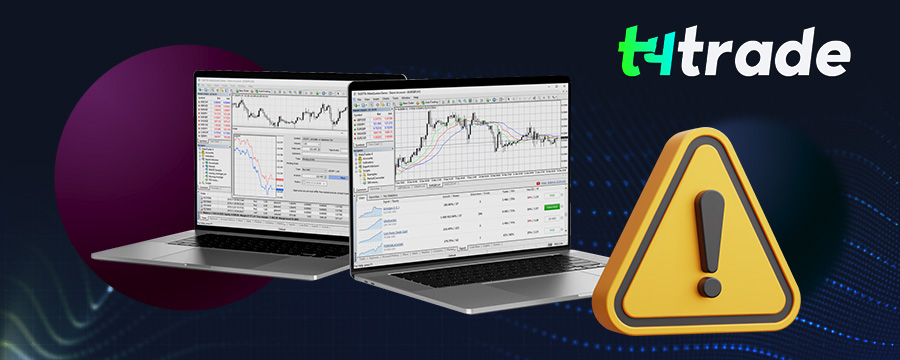Trading Contracts for Difference (CFDs), includes managing risk which is the key to potentially longer-term success. The volatile nature of financial markets requires a well-established approach that protects your capital while increasing potential profits. In this T4Trade's article, we will delve into practical risk management techniques for CFD trading, focusing on setting stop-loss orders, position sizing, and other essential strategies.
Understanding risk management in CFD trading
Before analysing risk management techniques, it's crucial to understand what risk is in CFD trading. Risk refers to the potential loss or unwanted outcome resulting from a trade. CFD traders face various risks, including market volatility, liquidity risks, leverage risks, and systemic risks. Recognising these is the first step toward effective risk management.
Risk Management Techniques
Stop-Loss Orders
One of the most powerful risk management tools available to CFD traders is the stop-loss order. A stop-loss order allows you to set a predetermined price level at which your trade will automatically close if the market moves against you. By using stop-loss orders, you establish an exit point that limits your potential losses, even if you're unable to monitor the markets continuously.
When setting stop-loss orders, it's important to consider both technical levels and risk tolerance as well. Technical levels such as support and resistance are good points to place stop-loss orders. Additionally, determining your risk tolerance based on your trading plan and overall financial objectives will help you set appropriate stop-loss levels.
Position Sizing
Position sizing is another critical aspect of risk management in CFD trading. It involves determining the appropriate trade size based on your account balance and risk tolerance. Position sizing ensures that no single trade puts a portion of your capital at risk, protecting you, therefore, from substantial losses. The fixed % method is a popular position sizing strategy. This method reduces your risk by designating a fixed amount of your trading capital to each trade. For example, putting only 2% of your account balance at risk in every transaction means that no one loss will have a detrimental impact on your whole trading portfolio.

Diversification
Diversification is a basic risk management strategy that consists of spreading your investments across many assets or markets. By diversifying your CFD trades, you reduce the impact that a single trade might have on the overall performance of your portfolio.
Risk-Reward Ratio
Another essential risk management technique in CFD trading is evaluating the risk-reward ratio of each trade. The risk-reward ratio represents the potential profit versus the potential loss of a trade. It helps you assess whether a trade is worth taking based on its potential reward in relation to the risk involved. A favourable risk-reward ratio typically means that the potential reward outweighs the potential loss. For example, aiming for a risk-reward ratio of 1:2 means that you are willing to risk 1 unit to potentially gain 2 units. By selecting trades with a positive risk-reward ratio, you ensure that your winning trades can more than compensate for your losing trades, leading to a potentially profitable overall trading strategy.
How to manage risk when trading CFDs
Regular Analysis & Adjustments
Risk management is an ongoing process that requires regular analysis and adjustments. Markets are dynamic and risk factors can change rapidly. Regularly reviewing your trades, assessing market conditions and adjusting your risk management strategies accordingly are essential for a potentially longer-term success.
Keep a trading journal to record your trades and analyse their outcomes. This will provide valuable insights into your risk management effectiveness and help identify areas for improvement. Try to learn from both winning and losing trades to refine your risk management techniques continually.
Avoiding overtrading & decision-making based on emotions
Overtrading and emotional decision-making are common factors that can lead to excessive risk-taking and poor trading outcomes. Overtrading occurs when traders enter too many trades without a clear strategy or justification. It often results in increased transaction costs and a higher possibility of encountering unfavourable market conditions.
Emotional decision-making, driven by fear or greed, can also lead to impulsive trading decisions. It's important to stick to your predetermined risk management plan and avoid making impulsive trades based on short-term market fluctuations or emotional reactions to losses. Keeping a disciplined mindset and adhering to your risk management rules will help you make rational and well-informed trading decisions.
Stay informed & keep learning
The financial markets are constantly evolving and staying informed is crucial for effective risk management. Keep up with the latest market news, economic indicators and geopolitical events that can impact the instruments you trade. This information will help you make more informed decisions and adjust your risk management strategies accordingly.
Continuously learning about risk management techniques and market dynamics is also important. Take advantage of educational resources, webinars, and reputable trading courses to expand your knowledge and enhance your risk management skills. The more you understand the complexity of risk management in CFD trading, the better equipped you will be to navigate the markets successfully.
Final Thoughts
The key to potential success in CFD trading is risk management. You can navigate the markets with confidence by putting into practice efficient strategies like placing stop-loss orders, position size, diversification, and regular research. Note that risk management is a continuous process and that it is crucial to modify your methods in response to shifting market conditions. By becoming an expert in risk management, you lay the foundation for potentially successful CFD trading.
Always put risk management first. Create a comprehensive risk management strategy, apply it regularly to your trading operations, and make sure it is in line with your trading goals and risk tolerance. By doing this, you'll be in a good position to successfully navigate the volatile world of CFD trading and meet your financial goals.











